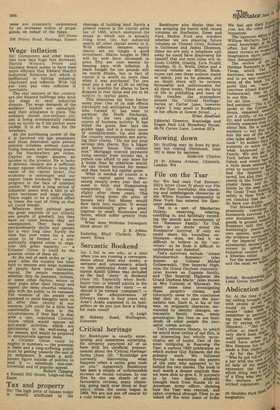Tax and property
Sir; The high price of houses today 1S usually attributed to the
shortage of building land. Surely a greater reason is the capital gains tax of 1965, which exempted the house in which one is actually living from tax, but subjected nearly all other capital assets to it. With inflation rampant equity shares are no longer a good investment. Shares bought in 1965 will by now have increased in price fifty per cent merely by keeping pace with inflation. A share bought for ten pounds will be worth fifteen, but in fact of course it is worth no more than when it was purchased. Yet one must pay a tax of £1.50 on selling it. It is possible for shares to have dropped in real value and yet to be subjcct te capital gains.
This iniquitous tax bites harder every year. One of its side effects (obviously not anticipated by those who framed it) has been to paralyse the Stock Exchange, which is the very spring and source of business activity. It has killed the goose that lays the golden eggs, and is a major cause of unemployment. Up and down the country accountants are advising their clients, "Do not put your savings into shares. Buy a bigger and better house. You cannot lose." Mortgage interest payments being exempt from income tax, a person can afford to pay more for a house than he otherwise would. He can invest beyond his means and then watch his capital grow. What is needed of course is a tapered capital gains tax, decreasing steeply every year that an asset is held, and disappearing completely (or becoming very slight) after three years. This would bring down the price of houses very fast. Money would flow back into equities. It would also incidentally give a great impetus to small businesses and farms, which suffer greatly from this tax.
What does Nicholas Davenport think about it?
S. R. Atkins
Enderley, Rhyd Clydach, Brynmawr, Brecs










































 Previous page
Previous page